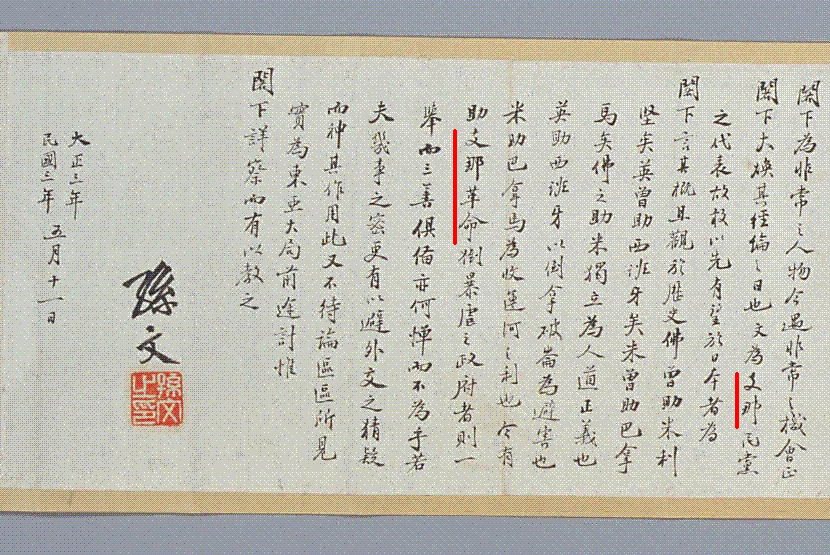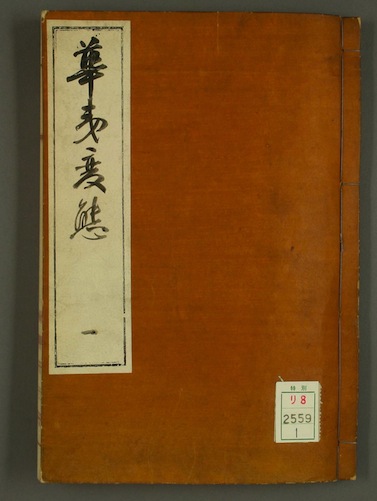About "Shina"
This article is machine-translated by Google.
Recently, "Shina" word rapid rise in the small circle around me, leaped called popular vocabulary. See the popular "Shina" word, I can not help but wistfully, want to understand its meaning, we must first of its original positive.
"Shina" sources
Some people say, "Shina" from Japanese シ na (Shina), is a former half of the twentieth century Japan to China derogatory term used to insult China. Is it really? But with the "Shina" is said on behalf of China from time to traitors, revolutionaries Huang Xing, Song had a history claiming Chinaman, even the Sun Yat-sen was also once called China "Shina."
About "Shina" Historically there is an anecdote. Kang Youwei have called kang tongbi second daughter, had he died in 1902 disguised as a man to the young age of nineteen weak, Mang Ling thousands of miles Amoy miasma mist from Beijing Gansu Corridor alone went to India to find the parent and the poem goes: ".. homes Wei Shan scrape dust, Dobkin bad if the house number three drinks on Ms. West, and I was the first person Shina" It seems self-proclaimed "Chinaman" is a point of pride.
"Shina" really is China's denigration of it? If so, how to explain the revolutionaries and patriots with Shina to refer to the Chinese? Accountability speech source, "Shina" word does not come from the Japanese, but from Sanskrit, is the Chinese people themselves transliteration from Sanskrit Buddhist scriptures over, Sanskrit classics with चीन (Cina) refers to China. Tang Dynasty monk Shi Hui Yuan book "Sutra sound and meaning," says: "Or said Shina, Yiyun true Dan, this turn of thinking, its people are more thoughtful, more produced, thought the name, which is now the country is Chinese also. "visible" Shina "Far from being a derogatory term for China, but China is praise. Emperor also as "Vatican book title" a poem: ".. Heli snake situation did not break five days Shina disciples text spirits worry-free speech, Hu Seng body piercing laugh nod"
The Japanese "Shina"
"Shina" is limited to the term of the Gion Buddhist terms, it is popular in Japan, how come? You may wish to start with the "Hua Yi Metamorphosis," a book. "Hua Yi Metamorphosis" is Japan's Edo period scholar Lin Chunsheng, Lin letter written by Benedict's book, which means China become barbarians, its text: Although probably Yuanshi Emperor into China, the world is still unknown shaved, now within the four seas are all Hu Fu, Chinese artifacts, then swing it demonstrated, canonic kings, this is the best joke of the actors with the military, Gaiyi casual, Himin ancient system of day and day die away, will not be re-see. Chongzhen impossible, Hiromitsu trap prisoner, Paul Tang Lu south end corner, and Manchus rampant Central Plains, it is Hua Yi change in the state also.
"After Yaishan, China is no longer" one that is also popular in Japan. Yaishan Battle Fight Song is Mongolia's last battle, both Song and legend into the army more than thirty million and finally Song military destruction at sea, back Song Emperor Lu Xiufu jumped into the sea, along with the destruction of the Song Dynasty. According to the Japanese believe that the Chinese civilization has been completely destroyed after Yaishan naval battle, after the Manchus are the second generation of the Qing Yuan Central Plains Han Chinese already died out, Japan is the real ceremonies. But the fact that "China" has the word "center of the world," meaning, if recognition of "China", and that Japan is "Dong Yi", and identified discrepancies Hua Yi, which began with the Japanese Buddhist term "Cina" to Generation refers to China.
Japan called China as "Shina" is also another reason, because Japan Names "Chinese place", is Japan's Honshu Island west of Sanyo Expressway, Heshan two vaginal area, he said. So in order to avoid ambiguity, it called China as "Shina." Also it suggested that "China" before the word to be recognized Republic of China, does not have any legal significance, because it has never been China's legal name of the country.
"Shina" is how to become insulted China Words
Early 20th century, the revolutionaries have mostly experienced in Japan, in Japan they saw as the universal call China "Shina" after, do not feel anything wrong, because the word itself comes from Buddhism. However, after the establishment of the Republic of China, "China" has become the official name of the country. After the May Fourth Movement, the rise of Chinese nationalism, Wen Yiduo wrote, "I am Chinese": I am Chinese, I was Chinaman, I was the Yellow Emperor gods blood Yin, the highest point on Earth I come, Pamir is my home. My race is a river, we shed the hill, we flow through the Asian continent, we are out of the beautiful customs. Great nation! Great nation! ......
In this case "Chinaman" or "Chinese people" is another name, but as the "Chinese people", said more and more popular, "Chinaman" has become a heresy. Yu Dafu, published in 1921, the novel "sink", the story of a student in Japan, because of the national inferiority complex towards sinking story. Fiction hero falls in love with a Japanese girl, but because of unbearable to hear that he was called "Chinaman" do not dare to tell the truth, and ultimately suicide. 1937 Sino-Japanese full-scale war, the Japanese military to China, called Shina, the Marco Polo Bridge Incident called "China Incident" to represent the Republic of China does not recognize, so the "Shina" will be in the hearts of all Chinese people to become Japan's derogatory term for Chinese .
After World War II, Japan renounced the use of "Cina", on behalf of the official use of "China" word. Interestingly, the Japanese now in order to avoid ambiguity, will often own "Chinese place" called "Sanyo Sanin place" to show respect for China.
Cina sources
Let us return to the "Shina" sources. In addition to Sanskrit Cina, the West and with more capital, "Shina" similar-sounding words to represent China, such as English or China Sino-, the French Chine, Latin Sina, Greek Thinae, this where Indo-European languages "Shina" from it? From a general point of view, "Qin", refers not only unified the Qin Empire, Qin also refers to the Warring States Period. This said, from the sixteenth century scholar Martini (Martino Martini), has been widely recognized as the academic community that is.
But this hypothesis there is doubt as follows:
1, Qin Dynasty, although powerful, but too short, its impact should be very limited, and the Spring and Autumn Period of Rong Di greatest influence should be owned by Qin Jin instead.
2, the ancient Indian language literature called China Cina much earlier than the Qin Dynasty in 1000 BC literature has emerged Cina, this time China is the Western Zhou Dynasty. Even late Gupta dynasty "technocratic" era in 330 BC, as early as the Qin King Wu, nearly a hundred years in the early Qin G, then Qin yet to rise, and its strength is far inferior to Shanxi.
3, more importantly, "Qin" belong in the ancient Chinese voiced initials [z] or [dz], in recent times become voiceless [tsʰ] or [tɕʰ], and Chinese Wu dialect and Xiang dialects still retained voiced. Ancient Indian and Western Regions in the national language is not the lack of dullness, why use the voiceless [ç] or [s] to interpret it?
Based on the above three suspects, scholar Zheng Zhang aryl yet have made Cina from "Jin" hypothesis. For the following reasons:
1, first in India and the West through Central Asia, people learned Chinese from the northern grasslands of barbarians. National grasslands south first encounter is when packet Zhou Wang Jin in the north, over three hundred years after they met Zhou Wang Qin packet.
2, "Jin" from antiquity has been a voiceless consonant [ts] (tsin), without affricates language it would take for the fricatives, namely sin.
3, "Tang Dynasty stele Nestorian Syriac text Dynasty," he pointed out that the ancient monument Syriac called China Sinstan, China artificially Sinaya, born in Alexandria Egyptians had Cosmas AD 547--550 years written in Greek. " World Christian topography "put the Chinese writing Tzinistan. These languages have no shortage of dullness, we can see the beginning of a borrowed word is voiceless.
Therefore, the term "Shina" is actually the name of the Western Zhou vassal state from "Jin" word evolution experienced by many peoples in the world, eventually becomes "Shina" back to China.

